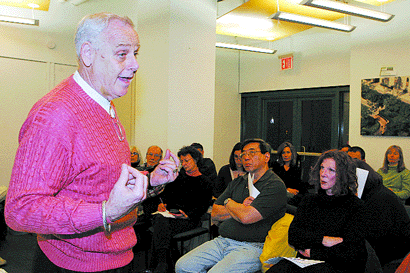By Ronda Kaysen
A group of Battery Park City residents launched a new charitable organization, Battery Park City Cares, in response to the tsunamis that wrecked havoc on several Indian Ocean countries last month.
More than 65 curious residents gathered on a bitter January evening at the Battery Park City Regatta to learn more about the fledgling new charity and find ways — aside from simply writing hefty checks to the myriad non-profits and non-government organizations flocking to Asia in recent weeks — to help.
“We’d like to create an organization that brings together the world family,” said Rosalie Joseph, co-president of the B.P.C. Neighbors Association at the Jan. 11th meeting. “We need your time. We need your brain and we need your work and we hope that together we can make a difference.” The Neighbors Association, at the urging of Joseph, formed an alliance with the B.P.C. Community Emergency Response Team (CERT) to form B.P.C. Cares.
In a lively and enthusiastic discussion, members of the audience and the founding B.P.C. Cares panel members tossed around various ideas, suggestions and strategies for the association. Residents seemed particularly interested in pairing up with a “sister city” in one of the 13 countries affected by the 9.0 earthquake and ensuing tsunamis that claimed 156,000 lives last December.
“This is about recovery and rebuilding,” said Barry Wolk, chief of emergency operations for CERT. Wolk cautioned the audience to be careful in selecting a sister city. Some affected areas, such as Banda Aceh, are in the midst of ongoing civil wars and may come with a host of complications when forming partnerships.
As audience members suggested sending survivors toys, therapists, backpacks and B.P.C. Cares-labeled schoolbooks, Helen Hall, a B.P.C. resident and chief accountant for UNICEF, the United Nations Children’s Emergency Fund, warned about the risks associated with well-meaning, but misdirected philanthropy. “They don’t go to therapists. They don’t know what crayons are,” she said of the victims. “They have a very different culture.”
She urged the audience to consider supporting countries in need — not necessarily affected by the highly-publicized tsunami — that enjoy little global attention. “Please think wider than the tsunami,” she said. “If you have private funds, consider countries that governments won’t touch” like Somalia, which was affected by the tsunami, but in need of aid long before the current disaster. The country comes with a host of political complications that makes it an undesirable recipient of government aid.
Joseph of the Neighbors Association welcomed Hall’s suggestions and encouraged her to join the association’s Identification Committee, which would identify a potential sister city. “We’re not rushing into fundraising, we’re taking our time so we can take all of these things into account,” she said. B.P.C. Cares, she said, was here for the long haul.
“I just don’t think you know what the long haul is,” said Hall.
Recalling personal experiences with Post Traumatic Stress Disorder in the wake of 9/11, residents suggested sending specialists to the area to train local healthcare workers in trauma therapy. P.T.S.D., a physical and psychological disorder that often affects survivors of chronic or acute psychological trauma, is a treatable illness.
Dr. Stephen Paul Adler, Ph.D., a New York City-based P.T.S.D. specialist who works with trauma victims in South and Central America, had his own set of concerns with the residents’ plans. “We have to know the society we’re working with or we’ll re-traumatize these people,” he said.
Nevertheless, working to alleviate trauma is a worthwhile effort, Adler said. “Every one of those kids has an attachment problem,” he said of the children who had lost parents or siblings. Years down the road, a generation of children may be unable to form lasting intimate attachments, creating social instability, he said, adding that treating trauma will help strengthen the local communities, in turn creating global social stability.
The group has other missions besides finding a sister city. It hopes to help Indonesian, Thai and Sri Lankan New Yorkers affected by the disaster, and offer “debriefing” sessions for aid and emergency workers returning from the Indian Ocean area. “We’re going to be dealing with long term projects domestically and internationally,” said Wolk.
In the next few weeks, the group plans to hold a candlelight vigil to gather support for the new organization and show their sympathy for the victims. “One of the wonderful things after 9/11 was seeing the [global] response,” said Ninfa Segarra, a member of the neighbors association and former deputy mayor of New York City. “We think we have a special responsibility to give to a community that is in distress.”
The next BPC Cares meeting will be held on Wednesday, Feb. 2nd at 7 p.m. in the BPCA Community Room located on West Thames St. at the Hudson River. The event is free and open to the public. For more information about B.P.C. Cares, visit www.batteryparkcitycares.org or email B.P.C.cares@email.com.
Ronda@DowntownExpress.com
WWW Downtown Express

























